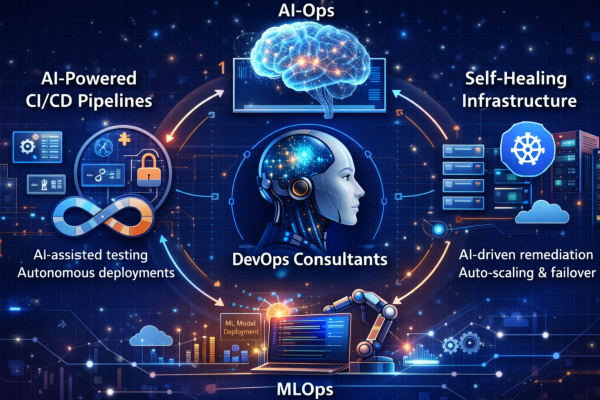How Can Machine Learning Be Used in DevOps Automation?
DevOps Consulting Services plays a crucial role in helping businesses improve their software development processes by integrating development and operations teams. The aim is to automate processes, improve efficiency, and enhance the overall performance of software development and delivery. Machine learning, as a subset of artificial intelligence, has emerged as a powerful tool that can be seamlessly integrated into the DevOps lifecycle. By leveraging machine learning, companies can further automate tasks, predict issues before they occur, and ensure continuous delivery with high-quality standards. In this blog, we will explore how machine learning can be used in DevOps automation, its benefits, and the potential it holds for revolutionizing the way DevOps teams work.
What is DevOps Automation?
Before diving into how machine learning enhances DevOps automation, it’s important to understand what DevOps automation is. DevOps automation services refer to the use of tools and scripts to automate the processes of software development, testing, deployment, and monitoring. It aims to minimize human intervention, reduce errors, and speed up the release cycle. Through automation, DevOps teams can focus more on building and improving software while ensuring that everything runs smoothly and efficiently.
The Role of Machine Learning in DevOps Automation
Machine learning can take DevOps automation to the next level by making it smarter, faster, and more efficient. It uses data to learn from past actions, predict future outcomes, and automatically optimize processes. By integrating machine learning into DevOps automation, teams can enhance their workflows and reduce manual interventions, leading to faster, more reliable software delivery.
Here are some of the key ways machine learning can be used in DevOps automation:
1. Automated Anomaly Detection
Machine learning algorithms are excellent at identifying patterns within large datasets. In the context of DevOps, these algorithms can be used to automatically detect anomalies in code, systems, or processes. Anomalies could be anything from performance issues, errors in code, or discrepancies in system logs. Traditional methods of anomaly detection might involve manually setting thresholds or writing custom rules. However, machine learning models can learn from historical data and dynamically detect anomalies without the need for predefined rules.
By automating anomaly detection, DevOps teams can respond to issues more quickly and proactively fix problems before they escalate, ensuring better uptime and user experience.
2. Predictive Analytics for Resource Management
DevOps teams are responsible for managing infrastructure resources, and ensuring that resources are allocated efficiently is critical to maintaining performance and avoiding downtime. Machine learning models can analyze historical data on resource usage patterns, such as CPU usage, memory consumption, and disk space. By understanding these patterns, machine learning algorithms can predict future resource needs and help teams proactively scale infrastructure to meet demand.
Predictive analytics can optimize resource allocation, leading to cost savings, better performance, and more efficient use of cloud services. DevOps Consulting Services can leverage this technology to provide clients with smarter resource management solutions.
3. Continuous Integration and Continuous Deployment (CI/CD) Automation
CI/CD pipelines are a core component of DevOps automation, helping teams deploy code changes frequently and consistently. Machine learning can enhance CI/CD pipelines by automating testing, code quality checks, and deployment strategies. For instance, machine learning can analyze historical data from previous builds to predict the likelihood of a failed deployment based on factors like code changes, test results, and previous incidents.
With these predictions, the system can automatically decide whether to proceed with a deployment or flag potential issues for further review. Machine learning can also optimize testing by automatically prioritizing test cases based on past trends, ensuring that the most critical tests are executed first.
By incorporating machine learning into CI/CD processes, teams can speed up the software delivery pipeline while minimizing the risk of errors and downtime.
4. Automated Root Cause Analysis
When issues arise in production systems, identifying the root cause is often a time-consuming and complex task. Traditional troubleshooting methods often require manual investigation, which can be slow and inefficient. Machine learning can help automate the root cause analysis by analyzing logs, metrics, and system behavior to quickly identify the underlying issues.
By correlating data from multiple sources, machine learning models can pinpoint specific problems, such as memory leaks, database slowdowns, or network bottlenecks. This automation reduces the time spent diagnosing issues and allows DevOps teams to focus on resolving them more quickly, improving system reliability.
5. Smart Configuration Management
Configuration management is a vital part of the DevOps lifecycle, ensuring that the development, testing, and production environments are consistent. Machine learning can be used to optimize configuration management by predicting configuration changes that may lead to issues. For instance, machine learning algorithms can analyze past configurations and system performance to suggest optimal configurations that improve system performance and security.
In addition, machine learning can automatically detect configuration drift (i.e., when configurations in different environments diverge) and take corrective actions to maintain consistency across environments. This level of automation saves time and minimizes the risks associated with configuration errors.
6. Intelligent Incident Management and Resolution
Incident management is an essential part of DevOps operations, as it ensures that systems are running smoothly and that issues are resolved quickly. Machine learning can assist in incident management by classifying and prioritizing incidents based on their severity and impact. For example, machine learning algorithms can learn from historical incident data and automatically categorize new incidents into predefined groups, such as performance issues, security breaches, or service outages.
Furthermore, machine learning can be used to recommend resolution steps based on past solutions to similar incidents. This helps DevOps teams resolve issues faster, reducing downtime and improving system reliability.
7. Optimizing Software Testing
Automated testing is a fundamental part of DevOps automation, ensuring that new code is validated before deployment. Machine learning can optimize software testing by predicting which areas of the code are most likely to contain defects, based on previous trends and patterns. For instance, if a certain module or feature has been prone to issues in the past, machine learning can prioritize testing those areas, improving efficiency and focusing efforts on high-risk components.
Additionally, machine learning can improve test coverage by identifying untested areas of the application and suggesting new test cases to cover them. This helps ensure that the software is thoroughly tested and that bugs are caught early in the development process.
8. Enhancing Security in DevOps
Security is a top priority in DevOps, and machine learning can play a significant role in improving security automation. By analyzing security logs, machine learning algorithms can detect suspicious activities, such as unauthorized access attempts or vulnerabilities in the system. These algorithms can learn to recognize new attack patterns and automatically flag potential security threats before they cause harm.
Moreover, machine learning can be used to automate the process of security patch management by identifying vulnerabilities in the system and suggesting appropriate patches based on historical data. This helps DevOps teams stay ahead of potential security threats and maintain secure applications and infrastructure.
Benefits of Integrating Machine Learning into DevOps Automation
The integration of machine learning into DevOps automation brings numerous benefits:
- Improved Efficiency: Machine learning automates repetitive tasks, allowing DevOps teams to focus on more strategic initiatives. By eliminating manual intervention, teams can streamline their workflows and reduce the time spent on mundane tasks.
- Better Predictive Capabilities: Machine learning enables teams to predict issues before they arise, allowing for proactive actions that prevent downtime and ensure smoother software delivery.
- Faster Issue Resolution: Machine learning can speed up incident response times by automatically identifying root causes, analyzing incidents, and suggesting solutions. This leads to quicker resolution and less disruption.
- Optimized Resource Utilization: Machine learning improves resource management by predicting demand and automating scaling processes. This results in cost savings and better resource allocation.
- Enhanced Security: By automating threat detection and vulnerability management, machine learning helps improve the overall security of DevOps environments, safeguarding applications and data.
Conclusion
Machine learning has the potential to revolutionize DevOps automation by making it smarter, faster, and more efficient. From automating anomaly detection to optimizing CI/CD pipelines, machine learning enables DevOps teams to enhance their workflows, improve software quality, and reduce downtime. By leveraging machine learning in DevOps, organizations can stay ahead of potential issues and ensure that their software delivery processes are continuously optimized.
For businesses looking to integrate machine learning into their DevOps workflows, seeking assistance from DevOps Consulting Services can be a valuable step. These services provide expert guidance and the necessary tools to help organizations adopt machine learning and other advanced technologies in their DevOps practices. The combination of DevOps and machine learning is a powerful one, driving efficiency, speed, and reliability in the modern software development lifecycle.
Author







